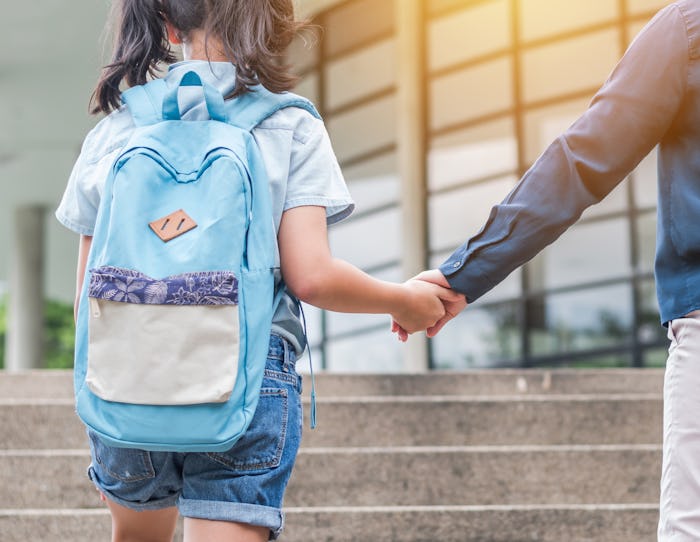Life
3 Things That Happen To Your Kid's Body When Their Backpack Is Too Heavy
Despite the fact that most kids have lockers in school, you might be surprised to learn how often they have to carry around their backpacks with them. I don't know about you, but it feels like my son's supplies weigh more and more each school year. Unlike adults, children's bodies are still growing and forming throughout much of the time they spend in school. Adding a disproportionately bulky backpack to their day can have unexpected effects on their developing bodies. So, what are some of the things that happen in your kid's body when their backpack is too heavy?
There are two factors to keep in mind when you're helping your child pack their backpack each day: the weight (which should not exceed 10 to 20 percent of your kid's weight) and the support that the backpack offers. "This year kids will be reaching for Moana and Emoji backpacks, not even thinking about whether they offer support," Dr. Karena Wu, a physical therapist, tells Romper. "Parents often grab a backpack because of the theme, not because of its safety factor." The first step to making sure your child stays safe and healthy is choosing form and function over fashion and fads.
As someone who lives with scoliosis and a connective tissue disorder, I'm no stranger to dealing with back pain and health issues that are exacerbated by unavoidable daily activities like picking up my son, carrying groceries, or any other weight-related duties. Yet, for children who have no real say in the matter, how might having a heavy backpack affect their physical health on both a day-to-day basis and over the long term?
Honestly, the whole backpack weight thing was not an issue that ever really crossed my mind, but after learning about the safety guidelines and recommendations for what an average backpack should weigh, you might want to check out exactly what happens in your kid's body when their backpack is too heavy.
1They Get Chronic Back Pain
"If a kid is carrying the wrong backpack they can get neck pain, mid back pain, and low back pain," Wu tells Romper. "They can have poor posture which can cause shoulder issues." So what exactly constitutes the wrong — or right — kind of backpack? "A good backpack should have some padding on the back and in the straps as well," Wu says. "Additional waist straps are great, too, because that can help disperse the load," Wu further explains. So the wrong kind of backpack would be one that doesn't spread the weight properly nor does it offer any kind of additional support or padding for comfort or ease.
2Their Posture Is Poor
"Depending on the child — and more than that, on the way the backpack is situated on the child’s shoulders — the position of the body will noticeably change," Caleb Backe, Health and Wellness Expert for Maple Holistics, tells Romper. So how can you ensure that your child isn't carrying too much weight on their shoulders and worsening their posture in the process? "A backpack should weigh no more than 10 to 20 percent of the child’s weight," she explains. So long as your kiddo's backpack is less than that recommendation, all you have to worry about is reminding them to mind their posture.
3They Lose Sensation & Strength
"Backpacks with tight, narrow straps that dig into the shoulders can interfere with circulation and nerves," Dr. Steven Dowshen, a pediatrician, told the official website for Nemours, Kids Health. "These types of straps can lead to tingling, numbness, and weakness in the arms and hands." Again, starting off with the right kind of backpack — like one with broad straps — can prevent blood flow issues. This could also serve as a great reminder to keep a line of communication open with your child so they know to come to you whenever something feels wrong with their body, because you never know when these daily discomforts can have long-lasting effects.
Check out Romper's new video series, Romper's Doula Diaries:
Watch full episodes of Romper's Doula Diaries on Facebook Watch.
